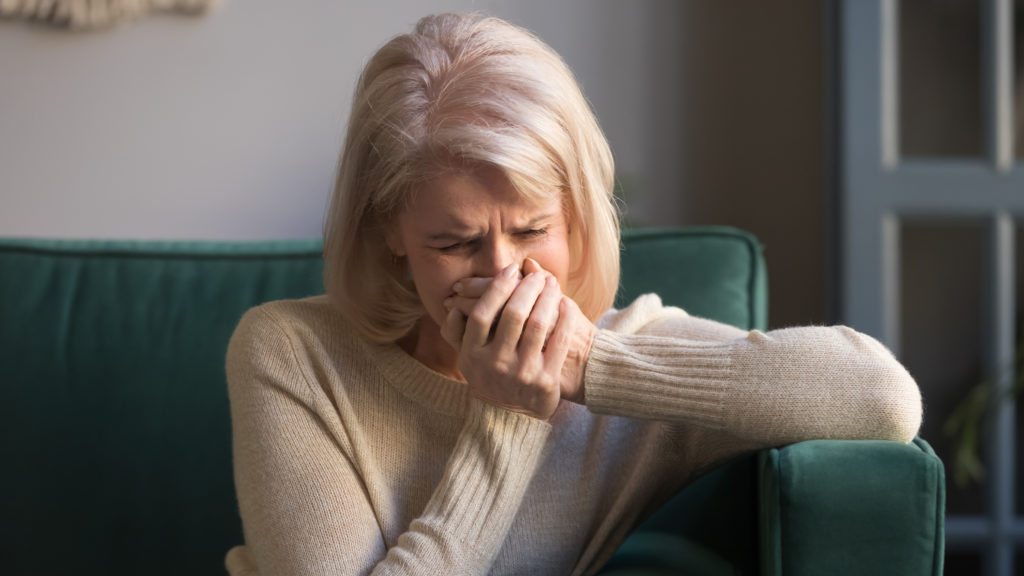It’s normal to feel added stress when a loved one passes. Grief is stressful, especially with the added demands of the estate business that follows soon after. Grief affects the body, mind, and spirit. It can impact your memory and ability to focus. It can affect your appetite; you may not be hungry, or you could be hungry all the time. And, of course, you may experience a wide variety of emotions and thoughts. It is physical, emotional, and spiritual, and like physical pain, emotional pain is real and exhausting.
Our Lady of Peace Bereavement Coordinator Amy Cotter says we’re not taught how to grieve, but it’s normal; it’s the flip side of having love. She says, “Losing someone close to you can make you feel vulnerable and take stock of your own mortality. It can stir up existential questions about God, a higher power, or the afterlife. It can be questions of meaning and identity. For example, “Who are you now that your spouse is gone? Or, “How will you find meaning from the loss and in your life moving forward?” She adds, “Loss evokes change and requires adaptation to a new reality without your loved one. This process of adaptation may include having to learn to do things that were previously taken care of by that person. And, depending on the loss and your relationship, the early stage of your grief can feel surreal, like you’re floating out there, detached from the world, which also causes stress.”
Feelings of regret and guilt are a normal part of loss and grief, as are seemingly contradictory thoughts and feelings. For example, Amy says, “People sometimes feel sad and relieved at the same time. There can be guilt that comes with this, but if you can embrace the paradox, and hold these two contradictory feelings side by side inside of you, stress can be relieved.”
Amy Cotter offers these 10 tips for relieving the stress of grief:
- Increase physical activity – Outdoor activities are best because nature is comforting and supports healing.
- Participate in mind-body activities – Biology shows that practicing Tai Chi, Qigong, or yoga reduces stress.
- Eat a healthy diet – Try to eat well, even if food doesn’t taste good to you.
- Increase water intake – Staying hydrated will help you feel grounded.
- Get sleep – Do your best to get plenty of rest, at least eight hours of every night.
- Avoid Caffeine and Alcohol – Your central nervous system is already heightened and you’ll sleep better if you don’t drink alcohol and you want to avoid numbing your experience.
- Find balance – Balance your alone time with being around other people. Alone time with your grief will help you move forward, but also make a plan to communicate with someone every day, via text, phone, or in person.
- Forgive yourself – Do this to decrease regret. “Shoulda, Woulda, Coulda” is not helpful. Notice it, name it, but don’t spend a lot of time with it because it doesn’t bear good fruit. Know that you did your best at any given moment in time and hindsight is always 20/20.
- Support yourself as you would a grieving friend. Let your inner critic go.
- Take time to grieve – You may need more than the 3-day funeral leave, granted by most employers. It’s okay to ask for more, and if you can’t afford un-paid leave, try to adjust your schedule to take care of yourself, like you would with a cold or the flu.
Let grief happen because it’s helpful. Acknowledge your thoughts and frustrations, identify places where you’re proud of yourself and where you find comfort. Keeping feelings of grief at bay causes stress. Amy says, “At the end of the day, grief cracks us open, and puts us in a very vulnerable space and that is the space from which we grow on a deep personal level. This can give us hope, and hope can alleviate stress.”

Our Lady of Peace provides one to one support (offered by phone, video or email), support groups, educational workshops, and annual memorial celebrations. All of our bereavement services are free of charge, unless otherwise indicated, and are open to the public.
